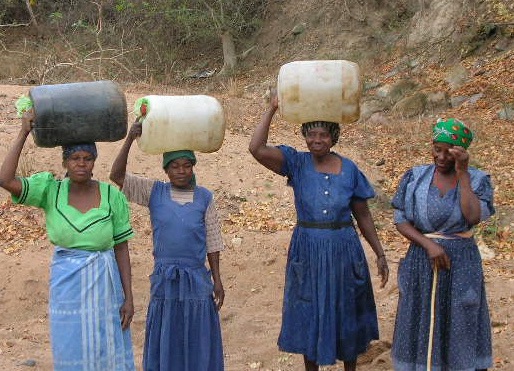In 2006, we raised funds from sudden and unexpected sources, one time donors, to drill and install three boreholes (drinking water wells) and pumps. Providing drinking water to two very remote communities who had been suffering in a four year drought at that time and offering water to the Kaphunga area by way of a community well at the Matjana school. In the case of the school, students carry buckets home to their homesteads after school, often saving them hours of work fetching water from a dirty stream when they would be better off doing homework!
Since ’06 we have since helped out in a series of smaller water projects; purchasing several 5,000 liter holding tanks for drought ridden communities in which to store government issue emergency water rations, supplying the last few kilometers of piping and local taps to another region, supplying taps and individual storage facilities to a small group of homesteads who gather rain water tumbling down a nearby rock face.
We enjoy being part of water projects. They are generally fast and relatively easy to pull together, they require larger amounts of cash, but leave in a community a sustainable improvement from which the villagers will benefit for years to come.
Of note, I have enjoyed doing water work with the group at Big Game Parks. BGP is the main body of conservation in Swaziland, running three impressive privately owned and operated parks within the country and visitors are encouraged to include over night and day trips to any of their parks in their itinerary. We have drilled two wells and supplied piping and taps with a regional community stricken by both drought and poverty.
Mick Reilly of Mkhaya Game Reserve, in particular, has been a delight to work with. He is organized, he follows through on his word, he spends our money wisely, he uses reliable trades and a first world drilling company. Further he insists that I return to a work site on my next trip, to take photos and to assure me that the money was spent wisely and to show me the project in operation.
One of my favourite projects was in reality a villager-relocation effort. A local group of villagers had been occupying crown land for years. The land was the ideal habitat for the endangered black rhino, a species that Mkhaya is proud to have in impressive numbers. The land had no water source and frankly was not great land for people. Mick felt that with a new source of potable water elsewhere, the villagers could be convinced to move on. Furthermore, the king had offered this land to Mkhaya for their black rhino project.
Mick found a site. It took an agonizing three separate drills to get water, which was not budgeted, but in the end, we supplied a decent volume of drinkable water and the villagers did follow. Thus both the people and the rhinos benefitted in this project!
Although there are no specific water projects booked at the time of writing, this is subject to change and anyone interested in water is encouraged to email or call us at Swazi Kids.
To give you an idea of costs, a well drilled with a working hand pump will cost $5-7,000. A water project involving piping, storage tanks and taps might be $2,500, but of course could vary widely depending upon the number of villagers and distance of piping. Those wishing to donate smaller amounts are also encouraged to do so in increments of $100. These funds will be pooled and go towards something larger or perhaps will buy the school new buckets in which the children will carry fresh water home to their homesteads.


